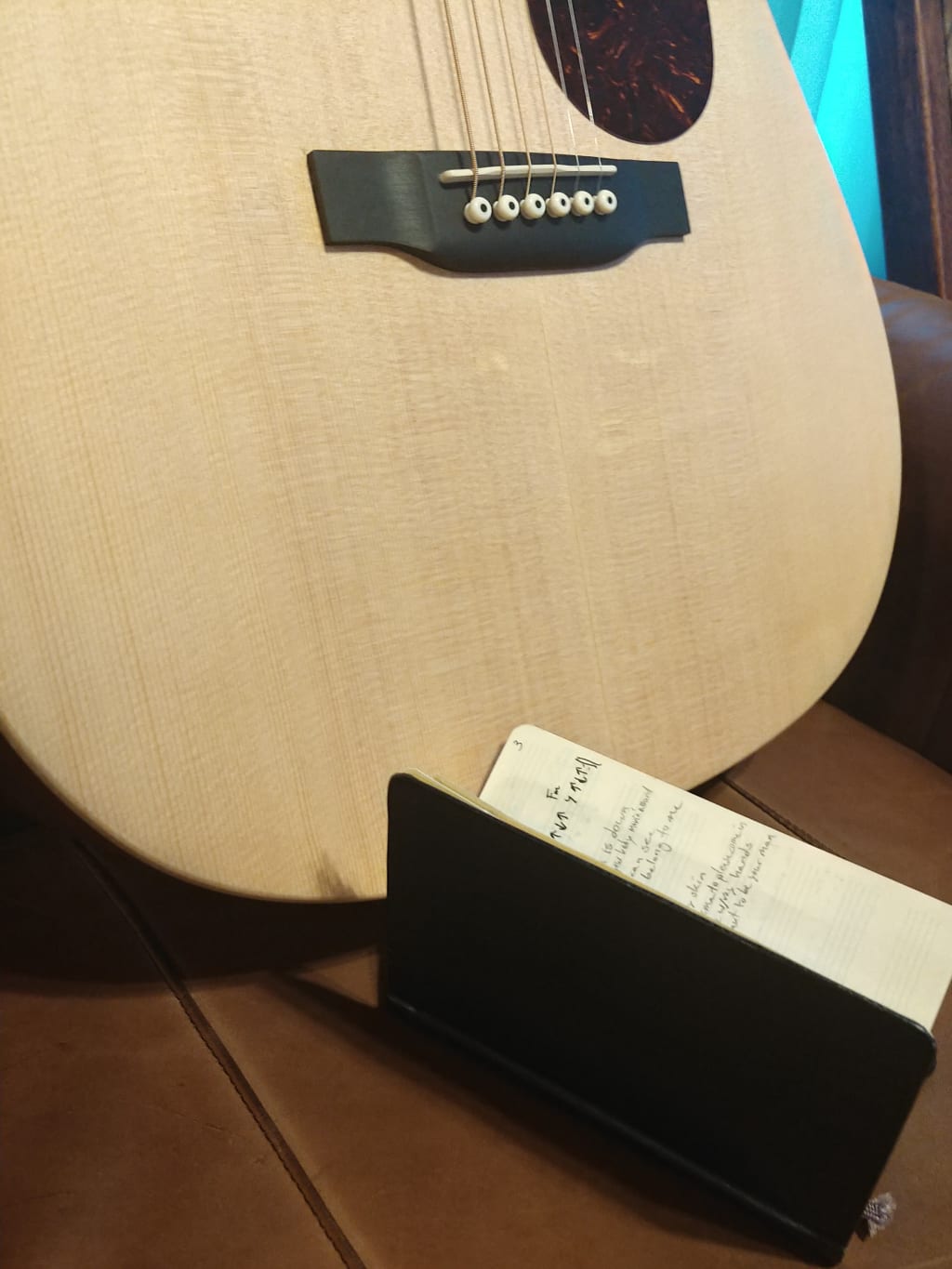
Hank stared into the room as his last chord quickly faded into the raised micro conversations of a social and disinterested club crowd. He had one last chance. One last song to win them over and earn his place on the long trail of singer-songwriters who made their break at the famous “Listening Scene.”
He remembered what his grandpa said. “You gotta be the energy, kid. Every musician chases the high of a captivated crowd. But the great ones ask, ‘what is the crowd chasing?’”
Hank thought he knew what his grandpa meant. If he had to be the energy, he was going to seize the people’s attention and never let it go. He opened with one of his best songs. It was also one of his oldest, a well-tested tune that had thrown more than a few campfire tailgate parties into overdrive and overtime. Hell, in his hometown, it was practically an anthem. But tonight, in this place, it had no power.
Everyone continued their conversations without any sign that they knew his song had ended. It was worse than silence. And it was then that he knew he didn’t belong here. His songs weren’t good enough. His voice wasn’t good enough…the club must have figured out he was Flint Landen’s grandson. That’s how he got here: his grandfather, the legendary Flint Landen.
Flint Landen was still regarded as one of the best songwriters to come along in the last 100 years. Every manager and producer of every hot new singer in the business wanted one of his songs and, in the rare cases where his grandpa let them record one, the song ended up living at the top of the charts for months. Kind, magical Flint. Hank was raised by him after his mom passed. It was a unique upbringing of studios, tours, and award shows, but Hank never minded. He loved being close to the magic. But now Flint was in assisted living with his health half-gone and Hank was left to create his own magic.
What the hell was he going to do? His songs obviously didn’t stand up to the finetuned taste of a Listening Scene crowd. His mind pulled to the book he found in Flint’s liquor closet. It was strange—just a little black book with one song followed by a bunch of blank pages. He didn’t have the courage to ask his grandpa about it. The fact that it was in the liquor closet was reason enough to avoid the subject. When his wife disappeared, Flint spent some dark times in that room and, even though he was no more than a toddler at the time, Hank remembered the day Flint locked it up for good; it was after the funeral, when Hank went to live with Flint. “Stay away from that closet, kid,” he had said. “My demons are sleeping in there.”
Talk about scaring an already traumatized child to his core! But Hank did stay away from the liquor closet, even as an adult. It wasn’t until last week that he finally opened it up. Flint’s house was one of the assets he had to sign over to the assisted living facility—even famous singer-songwriters ended up broke in the end—and Hank took on the responsibility of packing everything up. The little black songbook was the first thing he saw when he opened the abandoned closet and he launched in immediately, finding just the one song. There wasn’t much written down, just the lyrics, chords, and some tempo notes. But Hank immediately heard the unwritten melody.
He heard it now as the sound guy conspicuously waved his tablet from across the club. People were finally starting to notice that he wasn’t playing. What is the crowd chasing? Good question, grandpa. And it seemed obvious. They wanted Flint. They wanted the old days and the legends. And this time, Hank could deliver.
The song was slow, but from the moment Hank glided through the first arpeggiated chord of his grandpa’s song, the crowd was his. No one moved, no one spoke…it seemed as if everyone was holding their breath, as if a spell had been cast over every soul under the roof of the Listening Scene. This time, when Hank hit the last chord, it was to an eruption of whistles and applause. He never had a chance to enjoy it. As the crowd reached a crescendo of appreciation, the deafening pitch of the fire safety system cut through the club, immediately followed by a shower from the sprinkler system. Hank rushed to get his grandpa’s Martin guitar into its case and ran out the stage exit and into the street. Looking back, he could see flames shooting up from the Listening Scene. What the hell happened? A vibration in his pocket distracted him from any further wondering. It was his aunt. His grandpa was in the hospital again. It didn’t sound good.
When Hank arrived at his grandpa’s room, Flint was sitting up.
“Here he is,” said Flint. “How’d it go, kid?”
That was Flint, possibly on his death bed, but he was still thinking about Hank and his music.
“It was good,” said Hank. “I think it went really well.”
“Yeah?” said Flint. “That Listening Scene can be a hard one. Good for you, kid. What did you play?”
A twisting, squeezing feeling came over Hank’s stomach. He was starting to see the deeper side to what he had just done. He had stolen his grandpa’s song as his own. Not knowing what to say or how to process his actions, Hank tried to change the subject.
“Grandpa,” said Hank. “Enough about the show. What happened?”
“Just a little heart attack, kid,” said Flint. “Nothing to worry about.”
That’s how it was with Flint. They sat together quietly until Hank’s aunt came back to the room. Hank said his goodbyes and headed home to his apartment.
That night he had nightmares of the fire at the Listening Scene, dominated by screams and the smell of burning. He woke up soaked and headed toward the bathroom, catching a glimpse of the clock as he went by. 10 am. Shit. He forgot to set his alarm again. He went back to the bedroom and looked at his phone—there were two messages, one was from the café; with this latest mistake, his services were no longer required. The tips from that café had been the only thing keeping him afloat in this city. What the hell was he going to do now? Answering his question, the second message began to play. It was Sam Harlington! Harlington was one of Hank’s idols. And that was just the start of the good news.
Sam was at the Listening Scene the previous night and heard Hank play Flint’s song. He wanted to talk. With trembling fingers, Sam tapped the number at the top of his phone log and was greeted by the bright breezy “howdy” of Sam Harlington’s famous voice.
“Hi,” said Hank. “Mr. Harlington, this is Hank. Hank Stellen. I got your message…”
Hank had never dared to dream of a gift like what Sam Harlington, the Sam Harlington, offered him at that moment. With no strings attached, Sam wanted to pay for Hank to record “that song” in the same studio Sam had recorded his last five albums. It was the best studio in town—it’d cost at least twenty grand to record even the one song demo there.
“That song really stuck with me,” said Sam. “I can’t forget it. I think it’s going to put you on the map. Let’s get this done soon.”
Sam’s focus on “that song” hit Hank hard; it was time to talk to Flint. Hank was finally getting his break, but where he thought he would feel excitement and ecstasy, there was mostly anxiety and guilt. He couldn’t just go in and record his grandpa’s song; he had to at least talk to Flint and get his permission.
On the two-block walk to the hospital, Hank tried to think of smooth ways to bring up the song, but nothing came; he knew better. His grandpa, though he was always kind and fair with Hank, was a no-bullshit kind of man. He was going to be disappointed by this one. And he might not let Hank have the song—what would Hank do then? These breaks were a once-in-a-lifetime kind of occurrence—hell, there wasn’t even a Listening Scene anymore. Hank had been its last performer.
Walking into his grandpa’s room, the feeling was very different from the night before. Hank’s aunt greeted him with a fierce hug; it was clear from her face that she had been doing a lot of crying.
“It’s not good,” she said.
Hank turned to his grandpa. He was sleeping, but there was no look of repose on his face. Hank walked to the hospital bed and took Flint’s hand. Flint’s eyes opened.
“Here he is,” he said. “I’ve been waiting to see you.”
“How are you feeling?” asked Hank. Flint ignored the question.
“Son, I’m going to talk and you’re going to listen. I raised you. I know when you’ve done wrong ‘cause it’s always all over your face.”
“Grandpa…” started Hank.
“Stop there, kid,” interrupted Flint. “I know you. And I’ve been waiting all night. There are always rights to fix the wrongs. You put something bad out; I can feel it. Don’t torture yourself. Just put out more good than the bad. I’ve done plenty wrong in my life. But you—you’re my redemption. I wasn’t the best husband or the best father—having you in my life…you’re the best thing that could have happened to me. You’re my good. I know this is going to be okay now.”
“Grandpa…”
“I love you, kid. Put out some good.”
And just like that, Flint Landen, the songwriting legend, was gone.
Hank stayed out for the rest of the day, helping his aunt with any preparations he could, keeping himself busy in hopes of staying distracted, but, eventually, it was time to go home. Walking in the door, he noticed his grandpa’s guitar on its stand in the apartment. He didn’t remember taking it out of its case since the incident the night before and paused a moment, retracing his steps, unable to remember.
The guitar called to him. He picked it up and sat on the couch. There are always rights to fix the wrongs. He never got to tell his grandpa about what he did, but Hank felt comforted by those words. His grandpa knew something was going on. Put out some good. Flint really did know his grandson. But what good could Hank put out to overpower something so wrong?
Hank strummed a few chords as he reflected on the idea. Some words began to form. He should have never played his grandpa’s song like it was his own. And if playing it made him feel so awful, what would recording it do? He knew it wouldn’t bring anything good. He had to write his own “that song,” something that put goodness out into the world. He searched his heart and he could feel his grandpa and he could feel God—he could feel the good. And the good poured from his heart to his fingers and his lips, quickly forming a song of thanks for the countless gifts in life. When the song ended, Hank calmly wrote what he had just played and sang—he had no worries about remembering the chords or the lyrics—unlike the mind, the heart doesn’t forget. This was his song. And Hank didn’t worry about Sam or the recording studio…about getting his break or being famous. He was going to put out some good.
About the Creator
rdpiii
Veteran world language and music educator with an obsession for learning that has led to publications, certifications, and other accomplishments in music, writing, technology, and alternative medicine.






Comments
There are no comments for this story
Be the first to respond and start the conversation.